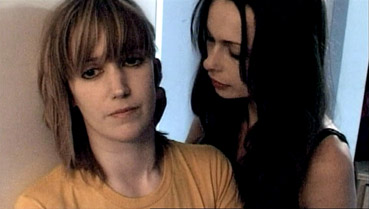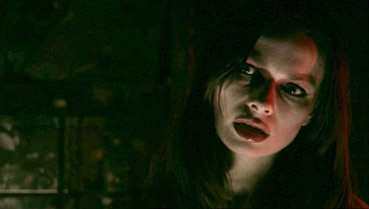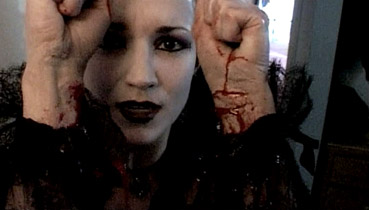|
I've
seen a lot of vampire films over the years, have read numerous
books on the subject and have even used it to teach genre
to media students. I am so familiar with its codes and conventions
and its multiple subtexts that I could recite them in my
sleep, and am all too aware of the restrictions they place
on the genre's scope for expansion of ideas, stories and
themes. As a result I tend to approach any new addition
to the vampire filmography with a mixture of curiosity,
enthusiasm and dread.
I'll
go out on a limb and suggest that there's little if any
mileage left in the classical vampire tale as inspired by
Bram Stoker. The lone aristocrat living in an isolated castle
preying off the local populace is no longer a figure of
fear or, thanks to his status as the number one vampire
parody figure, any real credibility. The Count has moved
to the city and he and his kind now run big corporations. To bring something new to the
genre is tricky without violating the very rules that define
it. Many have tried but with varying degrees of success
– the best examples in the past thirty years, the period
in which the modern vampire film came of age, have been
made by filmmakers with both an understanding of the genre
and the determination and imagination to bring something
fresh to it.

Without
doubt the most radical of all modern vampire films is George
Romero's 1975 Martin,
which threw off and even mocked the genre's core supernatural
element and presented us with the vampire as an urban serial
killer, teasingly refusing to confirm whether the title character was a real vampire at all or
merely a fucked-up kid who believed he was one. Although
never directly emulated, the film's influence can be felt
in some of the more interesting vampire movies that followed,
from the predatory travellers of Katherine Bigelow's Near
Dark to the dark New York subculture of Abel Ferrara's
The Addiction. It's
in this vein (sorry) of reality-based vampire stories that
directors Mark James and Phil O'Shea have grounded Vampire
Diary, a low budget (the estimate is £650,000),
shot-on-video feature that's uneven in development and execution,
but has enough interesting and inventive elements to make
it of real interest to horror and especially vampire movie
fans.
The
film is set amidst London's Goth scene, specifically the
so-named "Weekend Vampires," who live up to the
prejudices and outward perceptions of ordinary folk by making
themselves up, wearing fangs and drinking each other's blood
though razor-made cuts in their arms. A rather unlikely
prospect in the age of AIDS, you might think, but these
Goths don't seem to be quite as sharp as those I've
met and known over the years. Yeah, well, that's London
for you, or perhaps a slightly fantasy-tinged version of
it. Making friends in this world is Holly, a young filmmaker
shooting a documentary on the Weekend Vampire scene, who
one evening notices that she is also being filmed by one
of the Goth girls, Vicky. An evening at Holly's flat with
some of the group ends with Holly offering Vicky a room
for the night if she'll agree to be in her video, and the
two become friends and soon lovers. But a number of murders
that are blamed on a vampire-style attack prompt Holly to
suspect there's something odd about our Vicky, and she's
right. Vicky, it turns out, is no Weekend Vampire but the
real deal, and on top of that she's pregnant. Reluctantly,
Holly finds herself drawn in to Vicky's world and needs,
and starts to help her procure what she requires to feed.
The
filmmakers score their first points right here. It's a damned
good set-up and an original take on familiar themes. They
simultaneously bag their second points for a technical approach
that incorporates the inescapable and potentially detrimental
video look into the structure by presenting the entire story
as footage shot by Molly and Vicky. Yes we've all seen The
Blair Witch Project and its imitators and yes this
involves a few stretches regarding whether either camera
would actually be rolling at particular times, but on the
whole it works well, and the restricted viewpoint even helps build tension when either girl goes wandering
in the dark with their respective cameras on night vision
mode. The low budget does show, but the intimate nature
of the narrative and some pleasing cinematic economy (a
large scale police operation is suggested almost solely
through sound effects) mean this is rarely if ever an issue,
and the quality of the make-up is easily equal to that of
many mainstream horrors.

Elsewhere
the film drops a few points. For the first third any audience
with even a casual familiarity with vampire movies will be
way ahead of the characters, and we thus spend a bit too much time
waiting for them to catch up. The script wanders unevenly
between the sub-functional and something smarter, while
the performances suffer similar ups and downs, with scenes
played with conviction and commitment undermined by others that feel uncomfortably under-rehearsed but are
still too 'performed' to feel naturalistic. I couldn't help
thinking that a more spontaneous and improvisational acting
style would have better suited the film's visual approach,
giving it a more genuinely documented feel.
When
the actors do connect with their material it's a different
story. Anna Walton in particular gets increasingly under
the skin of vampire Vicky, proving there was a lot more
to the casting decision than prominent cheekbones and her
willingness to do the lesbian sex scenes. Morven Macbeth's
hesitant start as Holly moves into a different gear once
the truth about Vicky is out, Kate Sissons gets to play
a great self-sacrifice sequence as committed vampire devotee
Haze, and Jamie King makes for a likeable Adam, who may
not be the world's most convincing (or perhaps that's convicted)
Goth, but as the good friend who's secretly in love with
Holly he always feels genuine.
Not
everything works or hangs together, and occasionally I was
reminded of the wittier and more consistent Vampirology
episode of TV's Urban Gothic, in which a documentary
crew follow an urban vampire around Soho. But Vampire
Diary still has its moments, which increase in
frequency as the film progresses and include some memorable
and darkly effective scenes (including one that could put
a sizeable portion of the male audience off fellatio for life), and the decision
to arm Vicky with a bolt gun to disable her victims adds
a level of brutality that very effectively strips the vampire
of its romantic associations. Now and then it may feel like
it's treading water, but it builds to a nicely devised and
hauntingly handled final scene that lingers long after the
incongruous final shot of Vicky that follows it (see the
extra features below for more on this). A bold new direction
for the genre it may not be, but Vampire Diary is
still an intriguing and sometimes inventive take on the
urban vampire movie.
Shot
on what looks like a mixture of HD and mini-DV, the anamorphic
16:9 transfer retains the original video look, but this
is both deliberate and appropriate. Inevitably there is
some digital grain in places and the colour saturation and
contrast can vary depending on the light levels and location.
Detail is pretty good and black levels are solid when they
need to be. On the whole, a decent transfer.

I've
seen the sound listed on some on-line retailer sites as
surround 5.1, but the review disc only sports Dolby 2.0
stereo. This does the job well enough, with the music tracks
have the appropriate punch.
Vampire
Diary Featurette (13:58)
A brief but comprehensive making-of featurette built around
an interview with the two directors and including behind-the-scenes
footage and brief interviews with the leads actors and make-up
effects supervisor. The expected areas are covered, including
the genesis and planning, the casting and the use of the
video POV technique. There's enlightening coverage of the
Isle of Sheppy shoot which was hit by a day of unexpected
snow, weather that only appears in the film in that final
shot, which does at least explain its discontinuity with
the rest of the Sheppy footage.
It
took me a while to get into Vampire Diary,
but it's worth sticking with it for the interesting twists
and sequences of gruesome effectiveness that come later.
It's unlikely to find much of an audience outside of the
genre fandom, although its UK premiere at the London Lesbian
and Gay Festival suggest is could find itself stuffed unfairly
into two pigeonholes. I can't speak for the latter group
– to get to the relationship story you have to handle the
horror – but vampire film fans should definitely give it
a look.
|